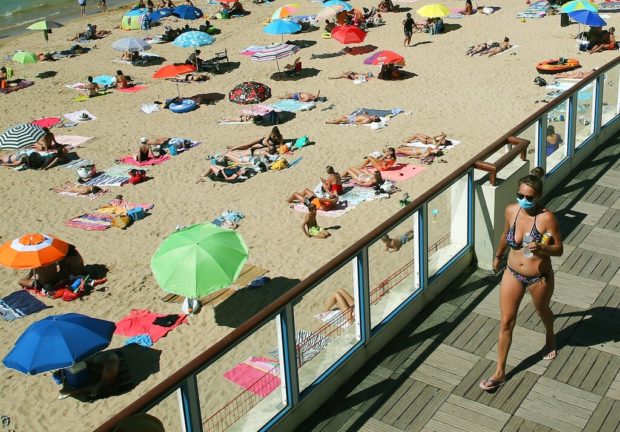In contrast to US, UN backs testing people without symptoms

A woman walks, wearing a face mask to protect against coronavirus, near the beach, in Saint Jean de Luz, southwestern France. (AP)
GENEVA — The World Health Organization said Thursday that countries should actively test people to find coronavirus cases even if they don’t show symptoms — a stance that comes after the U.S. health agency switched its policy to say that asymptomatic contacts of infected people don’t need to be tested.
At a press briefing, Maria Van Kerkhove, WHO’s technical lead for COVID-19, said when officials are investigating clusters of COVID-19, “testing may need to be expanded to look for individuals who are on the more mild end of the spectrum or who may indeed be asymptomatic.”
Yet new guidance from the U.S. Centers for Disease Control and Prevention says it’s not necessary for people who have been in close contact with infected people but who don’t feel sick to get tested. The agency had previously advised local health officials to test people who’d been within about 6 feet (1.8 meters) of an infected person for over 15 minutes.
Van Kerkhove said countries were free to adapt WHO’s testing guidance for their individual needs and while testing itself was important, it was equally critical to get testing results back fast.
“What’s really important is that testing is used as an opportunity, to define active cases so that they can be isolated and so that contact tracing can also take place,” she said. “This is really fundamental to breaking chains of transmission.”
Article continues after this advertisementVan Kerkhove also expressed concerns about public behavior, saying she’s growing “a little bit concerned” that the use of masks is leading some people to think they don’t need to keep safe distances from others.
Article continues after this advertisement“We’re seeing that people aren’t really adhering to the physical distancing anymore,” Van Kerkhove said. “Even if you’re wearing masks, you still need to try to do the physical distancing of at least one meter and even further if you can.”
Earlier Thursday, the WHO’s chief for Europe, Dr. Hans Kluge, warned that the coronavirus is a “tornado with a long tail” and said rising infections among young people could spread to more vulnerable older people and cause an uptick in deaths.
He said younger people are more likely to come into closer contact with the elderly as the weather cools across the continent and families move activities inside.
“We don’t want to do unnecessary predictions but this is definitely one of the options: that at one point there would be more hospitalizations and an uptick in mortality,” he said, speaking from Copenhagen, site of WHO’s European headquarters.
“It may be that younger people indeed are not necessarily going to die from it but it’s a tornado with a long tail and it’s a multi-organ disease,” he said.
Kluge said 32 out of 55 states and territories in WHO’s European region have recorded a 14-day new infection rate increase of over 10%, calling that “definitely an uptick which is generalized in Europe.”
He said the autumn presented a “tricky situation” because of widespread school reopenings, the onset of the flu season and the increased mortality among older people in winter months.
The U.N. agency this week recommended that children 6 to 11 wear masks at times to prevent the spread of the virus, especially in areas of wide community transmission or where social distancing cannot be maintained, and children 12 and older wear masks as often as adults.
As cases across Europe have increased amid the summer holiday season, WHO also issued advice for hotels and related businesses. WHO said hotels should consider reducing occupancy rates to ensure social distancing and said all staff and guests should comply with basic COVID-19 prevention measures like frequent hand-washing and mask-wearing.
It said physical barriers like protective plexiglass shields should be used to separate hotel staff and guests at reception desks. WHO said national guidance should be followed on whether or not indoor dining was allowed but that “buffets are not recommended.”
It said gyms, pools and spa facilities could be used with certain restrictions, like limiting the maximum number of people to ensure social distancing.
For more news about the novel coronavirus click here.
What you need to know about Coronavirus.
For more information on COVID-19, call the DOH Hotline: (02) 86517800 local 1149/1150.
The Inquirer Foundation supports our healthcare frontliners and is still accepting cash donations to be deposited at Banco de Oro (BDO) current account #007960018860 or donate through PayMaya using this link.